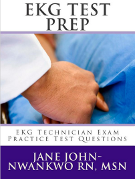State EKG technician training and certification requirements have not yet been established in Massachusetts. Although state agencies do not license personnel working as technicians in the cardiac care specialty, they may be titled as unlicensed assistive personnel (UAP) who are subject to the rules and regulations that affect the delegation of tasks. Those considering this career are encouraged to contact employers to learn more about job openings and local hiring expectations prior to submitting applications for employment.
Delegation Regulations
The Massachusetts Nurse Practice Act outlines very specific requirements for the delegation of nursing tasks to medical personnel who are unlicensed. The registered nurse who has chosen to delegate tasks to an EKG technician remains responsible for the nature and quality of care that a patient receives. Prior to delegation, it is important for the nurse to adequately evaluate the needs of the patient, the plan of care, and the implementation approach. The tasks performed by the technician must be included in their job description and be outlined within the organizational policies and procedures of the facility.
According to Massachusetts law, an unlicensed person is a trained, responsible individual other than the qualified licensed nurse who functions in a complementary role to the qualified licensed nurse in providing direct patient care or carrying out common nursing functions. The term includes, but is not limited to, nurses’ aides, orderlies, assistants, attendants, technicians, home health aides, and other health aides. Delegation of nursing activities to an unlicensed person must meet the following guidelines…
- The licensed nurse is responsible for the care given
- Activities are within the scope of the licensed nurse
- The nurse has assessed the patient’s nursing care needs
- Does not require nursing judgment
- Can be properly and safely performed
- Unlicensed personnel have documented competencies
- Supervision is provided by the licensed nurse
The degree of supervision required is dependent on the stability of the patient, the training and capability of the unlicensed person, the nature of the nursing task, and the availability of a qualified licensed nurse. Tasks that may be delegated generally include those relating to the collection, reporting, and documentation of simple data; nutrition; comfort; social; hydration; mobility; elimination; and hygiene. Tasks that may not be delegated include those that require nursing assessment and judgment during implementation, creation of the nursing care plan, and medication administration. The most common tasks that an EKG technician will be expected to perform include electrocardiogram administration, telemetry, Holter monitoring, and equipment maintenance.
Education and Training Requirements
New accountability initiatives within all healthcare specialties have made formal education, training, and certification more valuable than ever. Most medical facilities that offer cardiac care services prefer to hire technicians who have at least a high school diploma or two-year Associate’s Degree in an allied health field. In addition, many employers now expect applicants to have prior experience in providing direct patient care to patients in a medical setting. Experience with patient care demonstrates that an applicant understands the unique challenges associated with patient care and is well-suited to the demands that they will face within the cardiac specialty. Less challenging areas such as nurse’s aide and medical assistant provide the foundation that individuals need in order to become competitive applicants for an EKG technician job opening.
Most employers provide in-house training to those who are new to cardiac care. While there are some colleges and universities that do offer certificate programs for EKG technicians, few formal degree programs exist. For this reason, most technicians acquire the knowledge and skills that they need through direct instruction and hands-on training at the hiring facility. Once the training process has been completed, the technician will usually be required to pass a certification exam in order to document mastery of important competencies.
State Contact Information
Massachusetts Department of Health
Phone: (617) 624-6000
Toll-Free: (800) 414-0168
Email: Contact Form
 239 Causeway St. Boston, MA 02114
239 Causeway St. Boston, MA 02114
Massachusetts Board of Nursing
Phone: (617) 973-0900
Fax: (617) 973-0984
Email: Contact Directory
239 Causeway St., Ste. 500, 5th Floor Boston, MA 02114





